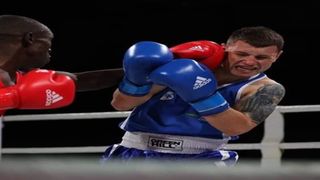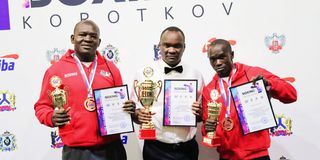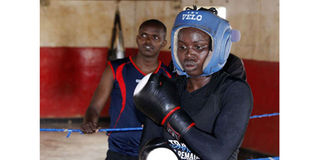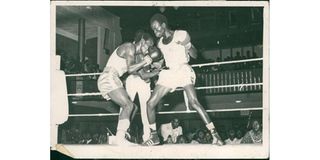
Kenya’s Nick "Commander" Okoth (left) lands a left hook against Serge Kishko from Ukraine in their featherweight semi-final bout of the Konstantin Kototkov Memorial Boxing Tournament that ended on May 15, 2021 in Khabarovsk, Russia.
| PoolSports
Premium
The pain of 33-year Olympics medal drought and the promise Tokyo brings
What you need to know:
- One would have to go back 33 years to 1988 when a Kenyan boxer won a medal at the Olympics
- On Saturday, Kenya will launch her assault on the medals from 6.51pm local time (12.51pm Kenyan time) when captain Okoth takes on Mongolia’s Tsendbaater Erdenebat in the round of 32 at the Kokugikan Arena
- Kenyan boxing took a turn for worse when Major (Rtd) Marsden Madoka retired after the 1996 Atlanta Olympics and has not recovered since then
Kenyan boxers head to the Olympic Games this year on the backdrop of poor performance in the multi-sport quadrennial championship.
One would have to go back 33 years to 1988 when a Kenyan boxer won a medal at the Olympics. At the 1988 Seoul Olympics, Robert Napunyi Wangila and Chris Sande won gold and silver medals respectively in boxing and as boxing competitions get underway Saturday in Tokyo, Kenya’s hopes of ending the drought of medals are pegged on captain Nick “Commander” Okoth, Elly Ajowi, Christine Ongare and Elizabeth Akinyi.
The team is led by coach Musa Benjamin, assisted by Dave Munuhe and John Waweru.
On Saturday, Kenya will launch her assault on the medals from 6.51pm local time (12.51pm Kenyan time) when captain Okoth takes on Mongolia’s Tsendbaater Erdenebat in the round of 32 at the Kokugikan Arena.

Elly Ajowi (left) and Nick "Commander" Okoth (right) and referee Nelson Otieno display their trophies and medals at the Konstantin Kototkov Memorial Boxing tournament that ended May 15, 2021 in Khabarovsk, Russia. Okoth is expected to lead from the front as he launches Kenya’s Olympics campaign in the ring with an opening bout against Mongolia’s Tsendbaater Erdenebat on Saturday afternoon.
The second bout for Kenya will be on Sunday from 11.15am local time (5.15am Kenyan time) when Ongare engages in a flyweight (48-51kg) contest against Irish Magno of the Philipines.
Kenya’s two other boxers - heavyweight Ajowi (81-91) and welterweight (64-69kg) Akinyi - have both received byes to the next round. They face against Cuba’s Julio la Cruz and Alcinda Helena Panguana of Mozambique, respectively.
Ajowi will fight the Cuban on Tuesday from 6.36pm (12.36pm Kenyan time) while Akinyi’s bout is from 8.12pm (2.12pm), also on Tuesday.
The performance of Kenya’s national boxing team “Hit Squad” in the past one year, particularly in the 2020 African qualifiers for the Olympic Games held in Dakar tell the story of how the sport has deteriorated locally.
In March this year, Kenyan boxers competed in the Africa Zone Three tournament in Kinshasa. In April this year, four Kenyan boxers competed in the Konstantin Kototker Memorial Boxing in Khabarovsk in Russia, with featherweight Nick Okoth and super heavyweight Elly Ajowi claiming bronze medals.
Early last year before Covid-19 interrupted Kenya’s preparations for the Olympics, Kenya entered a team of eight male and five female boxers in the 2020 African qualifiers for the Olympics in Dakar. Okoth and Ongare both pounded their way into the African squad for the Tokyo Olympics.

Kenya's boxer Christine Ongare Christine Ongare shadow boxes during a training session in Nairobi on June 8, 2021, ahead of the 2020 Tokyo Olympic Games.
Ajowi and Akiny were left waiting for the final qualifier tournament - the World Olympic Repechage in Paris - which did not take place due to Covid-19 disruption. The two finally qualified for the Olympics courtesy of their ranking in Africa.
Kenyan boxing has been in a sorry state and this is clear from past championships which Kenya boxers had featured and failed to impress. Mismanagement and wrangles have made the once-dreaded “Hit Squad” a shadow of its former self.
Sports administrators have come up with ambitious programmes and proposals in well-attended press conferences with nothing to show for the time. Whereas rallying, golf, rugby and women’s volleyball has made some strides, others sports like weightlifting , wrestling, netball, tennis ,swimming , bowling, football and boxing have stagnated.
The poor performance of the “Hit Squad” in the Olympic qualifiers came at a time when local boxing enthusiasts were hoping at least five male boxers would qualify for the 2020 Olympics to improve on the three (light flyweight Peter Mungai, welterweight Rayton Okwiri and bantamweight Benson Gicharu) Kenya sent to the 2016 Olympics in Rio de Janeiro.

Kenya women’s boxing team welterweight Elizabeth Akinyi trains in Nairobi on July 30, 2019.
Tokyo is a significant place for Kenya. It's in Tokyo that Wilson Kiprugut Chumo won Kenya her first Olympic medal when he claimed bronze in 880 yards (800 meters) in the 1964 Olympics.
Philip Waruinge made his Olympics debut in 1964 and fought gallantly, only losingin the pre-quarterfinals. It is worth mentioning that the 1964 Tokyo Olympics lifted Waruinge’s spirit, and he won gold medal at the 1966 Commonwealth Games in Kingston, Jamaica in the featherweight category.
Waruinge who was on of the pioneer boxers at Nakuru Amateur Boxing Club (Madison Square Garden) successfully defended the title in 1970 in Edinburg, Scotland. But his greatest achievement was at the 1968 Olympics in Mexico City where he won Kenya’s first Olympic medal in boxing by claiming bronze.
Waruinge also won the Val Baker Trophy which is usually awarded to the best boxer and Olympic gold medallists.

Philip Waruinge, holding the trophy, is joined by his brother, lightweight boxer Sammy Mbogua (far left) and teammates, in a moment of celebration after yet another victory for the national boxing team. Waruinge was the 1966 and 1970 Commonwealth Games gold medalist and 1968 and 1972 Olympic Games bronze and silver medalist. He is the most decorated boxer in Kenya's history.
Waruinge’s feat inspired other boxers, among them the diminutive light flyweight Stephen Muchoki who followed in his footsteps by winning gold medal at the 1974 and 1978 editions of the Commonwealth Games held in Christchurch (New Zealand) and Edmonton (Canada) respectively.
Muchoki also claimed silver medal in the inaugural World Boxing Championships in Havana, Cuba in 1974 and won gold the following year in Belgrade in the former Yugoslavia. He turned professional in Copenhagen in 1979. His peers were light middleweight Ayub Kalule and light heavyweight Mustapha Wassajja from Uganda.

Kenya Breweries boxer Stephen Muchoki (left) goes defensive in this bout against an unidentified Ugandan boxer representing Kampala City Council at Nairobi City Hall, Muchoki won on points.
Kenyan boxing took a turn for worse when Major (Rtd) Marsden Madoka retired after the 1996 Atlanta Olympics and has not recovered since then.
Boxing Association of Kenya (BAK) chairman Anthony Otieno Ombok “Jamal” is yet to take any meaningful step to return the sport to the glory years. He faces the tough task of reorganising and rebuilding a new team for future international competitions, starting with the 2022 African Games.
Otieno took over from Mombasa-based John Kameta whose 10-year reign at the helm of BAK was characterised by controversy.
Kenya’s boxing captain at the Olympics, featherweight Okoth, heavyweight Elly Ajowi, flyweight Ongare and bantamweight Akinyi who carry Kenya’s hopes of ending 33-year medal drought are not short of inspiration. They will look up to featherweight Waruinge who claimed silver medal at the 1972 Munich Olympic Games and flyweight Ibrahim “Surf’ Bilali who claimed bronze in 1984 Los Angeles Olympics.
Others are the late welterweight boxer Robert Wangila who is Africa’s first Olympics gold medallist from 1988 Seoul Olympics , bantamweight Samuel Mbogu and light welter Dick “Tiger” Murunga, both of whom are bronze medallists from 1972 Munich Olympics, and Christopher “Bingwa” Sande, a bronze medallist from 1988 Olympics in Seoul.
Perhaps BAK can start by reviving its dormant branches such as Nyanza, Western, Eastern and North Rift which have an abundance of talent. It aslo needs to work closely with established boxing clubs like Kenya Prisons, Kenya Police ,and Kenya Defense Forces, as well as organisations such as Kenya Breweries, Kenya Ports Authority (KPA) and Postal Corporation of Kenya that run boxing clubs.
These institutions contributed a lot to the development of boxing among youth whom they later recruited.
Madoka’s leadership rode on a solid executive committee of treasurer Stanley Wachanga, secretary general Harrison Kilonzo, Gen (Rtd) Peter Waweru, John Roberts, James Ndisi, Victor Mbaji, and Mukuru Mukundi.
Other boxing officials of the time were Humphrey Wamba, Cornelius Monteiro, Henry Omollo, Elisha Abetsi, Joseph Saoke, Isaac Mbote, Joseph Mwangi Muthoga and Richard Mwangi. All of them served as international referees under the auspices of international boxing association AIBA.
Today, there is no Kenyan referee in AIBA’s list.





